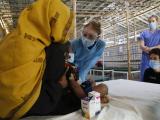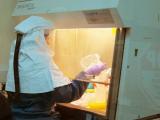Sep 23, 2008 (CIDRAP News) – Two organizations recently reported winning US government contracts for research on drugs that could work against multiple bioterror-related diseases such as plague, tularemia, and anthrax.
SRI International, a nonprofit research and development institute based in Menlo Park, Calif., said this week it was awarded a 3-year, $8.3 million contract by the Defense Threat Reduction Agency (DTRA), part of the Department of Defense (DoD), to develop new biodefense compounds.
Advanced Life Sciences Holdings, Inc., based in Chicago, announced in August it had received a 2-year DTRA contract worth up to $3.8 million to further study cethromycin as a potential broad-spectrum medical countermeasure.
The SRI contract is for preclinical research to develop drugs effective against a broad range of potential bioterror agents, including those that cause anthrax, plague, and tularemia, the institute said in a news release. It follows a $9.5 million contract that SRI received last year to identify already-licensed drugs that are effective against biological threats.
Under the new contract, "SRI will optimize and develop compounds from its proprietary bis-indole drug platform for both prophylaxis and treatment of biological warfare agents," the release states.
Dr. Ling Jong of SRI's Cancer Research Center said bis-indoles are based on compounds found in cruciferous vegetables, and the institute is preparing to launch clinical trials of one bis-indole compound for use in cancer prevention.
"Through drug screening, SRI has identified new bis-indole analogues that have broad-spectrum antibiotic activity," the SRI statement said.
Advanced Life Sciences will use its DTRA funding to study the efficacy of cethromycin against category A and B biological warfare agents such as Francisella tularensis (the tularemia agent), Yersinia pestis (plague), and Burkholderia pseudomallei (melioidosis), according to a company news release.
Cethromycin is an oral antibiotic in late-stage development for the treatment of respiratory tract infections, including community-acquired pneumonia, the company said. The drug is also being tested as a postexposure preventive treatment for inhalation anthrax.
In a study completed in May 2007, cethromycin was 100% effective in protecting monkeys against a lethal dose of inhaled anthrax, whereas the standard anthrax drug, ciprofloxacin, was 90% effective, the statement said. The company said cethromycin has also been found to be very active against B pseudomallei.
Under the contract, $1.8 million is available over 9 months to launch studies of the drug's effectiveness against the three pathogens, and the remaining $2 million may be awarded over the ensuing 15 months to complete the work, the statement said.
See also:
Sep 22 SRI news release
http://www.sri.com/news/releases/092208.html




















